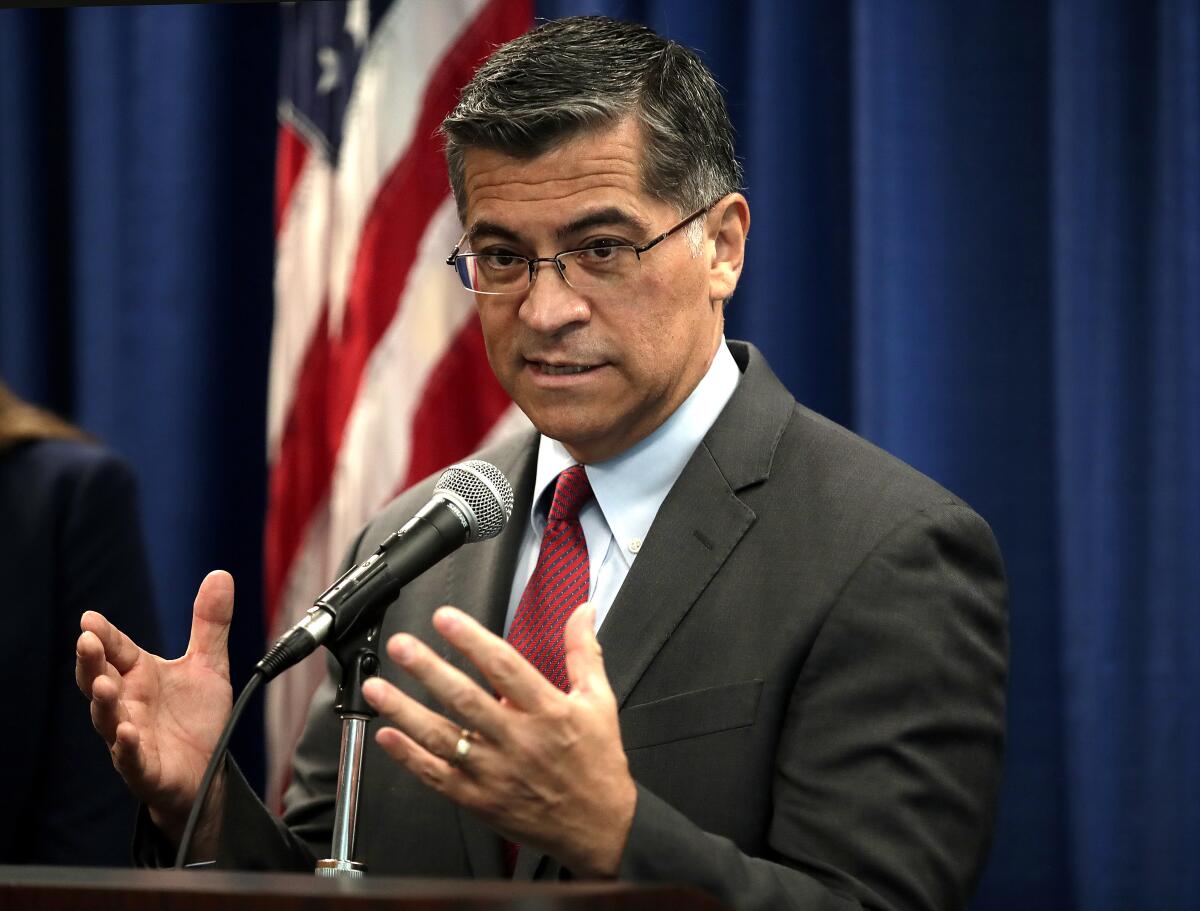What California needs in a new attorney general

- Share via
TV anchors and headline writers like to call the attorney general California’s “top cop,” but in addition to being a silly nickname, it’s completely inaccurate. The attorney general is no police officer and for that matter rarely acts as a prosecutor. Only one of the last five attorneys general had any prosecutorial experience before taking the job. In this state and others, attorneys general tend to make their mark by filing lawsuits, not by pursuing criminals.
Current Atty. Gen. Xavier Becerra is best known for his 122 suits against the Trump administration to block its environmental, immigration and health policies, among other targets. His predecessor, Kamala Harris, went after banks and phone companies, and before her, Jerry Brown sued Countrywide Financial, an early battle in the mortgage crisis. Their advocacy was welcome and essential.
But as those elected lawyers were going to court, Californians were undertaking a historic effort to correct a wayward criminal justice system. They received little leadership or even guidance from precisely those officials best positioned to provide it: the attorneys general.
Brown, in fact, fought against federal oversight of the state’s unconstitutionally crowded prisons — until he became governor and began championing reform. Then the state needed an attorney general who could sort through the programs and ballot measures that characterized the Brown years — prison realignment, “three strikes” reform, Propositions 47 and 57. But beyond writing the official summaries of the ballot measures, Harris offered little on these subjects, even though she had positioned herself as a top reform strategist. The criminal justice portion of her tenure was marked by one failed high-profile program after another, introduced with great fanfare only to evaporate before completion. Examples included a task force to define “recidivism” and an L.A. County jail program touted as a future model for rehabilitation statewide. Both came to nothing.
Becerra, likewise, was practically mute during the 2020 summer of discontent, offering little guidance as Californians joined the rest of the country in debating racial equity and the powers and duties of police. He was known more for resisting police reform legislation than steering it. His legal settlements with Bakersfield and Kern County over law enforcement abuses were too late in coming, and his even later investigations into the Vallejo police and the Los Angeles County Sheriff’s Department seem like mere parting gifts for his successor as he prepared to vacate the office and move to President Biden’s Cabinet.
California stills lacks an attorney general ready to lead a responsible and effective transformation of the criminal justice system.
Gov. Gavin Newsom now has a rare opportunity to appoint such a person, assuming the Senate confirms Becerra as Biden’s secretary of Health and Human Services.
Because the vacancy would be filled by appointment, not election, the candidate need not be a politician beholden to police unions and their campaign donations. That freedom could allow the attorney general to drive long-delayed and desperately need police reforms — for example, initiatives to prevent abusive officers from jumping from one department to another, pressure resistant police agencies to release information on misconduct, and establish standards and guidelines for alternative crisis response by unarmed clinicians. It should allow the attorney general to assert a far more muscular brand of oversight of abusive law enforcement agencies.
The new attorney general should also lead efforts to limit sentence lengths and make parole available to more long-term inmates. Such recommendations would be as controversial as they would be transformative, so they’d be bound to draw opposition from the backward-looking prosecutors and police chiefs who falsely claimed that Proposition 47 and other major reforms would cause waves of violent crime across the state. We need an attorney general who will champion the good proposals for their merits and weed out the bad ones — and then propose additional reforms and set additional goals to help reduce unnecessary incarceration, incentivize inmate rehabilitation and ease prisoners’ responsible reentry into society.
And by the way, we need all of that at the same time we need continuing advocacy in all of those civil battles that led past attorney generals to court.
Becerra’s Cabinet nomination has run into Republican resistance, consuming his attention and leaving the prospect of an extended period with even less leadership from the attorney general’s office. And Newsom, facing a possible recall election, might be tempted to seek detente with law enforcement unions by nominating an attorney general to their liking.
That would be a tragic miscue. California can ill afford another attorney general for whom criminal justice reform is just background scenery. It needs its lawyer to be a leader, and it needs that leader as soon as possible.
More to Read
A cure for the common opinion
Get thought-provoking perspectives with our weekly newsletter.
You may occasionally receive promotional content from the Los Angeles Times.









